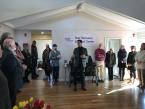For Islanders wrestling with addiction, isolation and stress brought on by the coronavirus pandemic has made a perennial problem worse, and recovery specialists on Martha’s Vineyard are bracing for the added perils of a dark winter ahead.
“We know more people are coming into the emergency room, that there are more episodes of overdose, that there are people who have longer-term sobriety who have had relapses,” said Dr. Charlie Silberstein, a psychiatrist who serves as medical director for the Martha’s Vineyard Community Services Island Counseling Center. “This is a really painful time for lots and lots of people.”
Though specific data is hard to come by, in a series of interviews with the Gazette, specialists from all corners of the Island’s recovery community reported a sharp increase in people seeking help for substance use disorders at a time when care is more complicated to provide. Stay-at-home advisories have limited in-person counseling and forced many recovery meetings to cancel or move online.
Excessive drinking has been the most common form of substance abuse during the pandemic, they said.
But members of the recovery community also cited an increase in services and cooperation among agencies on the Island.
“What’s been exciting is how hard organizations have worked to have services still in place,” said Dr. Karen Casper, emergency room physician and director of the Martha’s Vineyard Hospital substance use disorders program. “There’s just so much available to help people, and not just when they come to the hospital with use disorders, but also when they leave.”
Dr. Casper said the volume of people seeking help at the hospital for the first time has climbed, after a lull early in the pandemic.
“I’ve definitely been struck by the number of people that have never come in for help before,” she said, noting a particularly busy October. “We have a certain percentage of patients that have alcohol use disorders that are here on the Island . . . [but] I think of the stress of the pandemic has a lot to play into it because alcohol use is maybe more accessible.”
Calls to the Island Counseling Center’s emergency hotline have also surged since the pandemic began, more than doubling that of previous years, said Robert Cropper, who supervises the recovery coach program.
“Normally, I would take three or four calls a week over the summer,” he said. “By mid-June, it was two or three calls a day.”
The trend is also apparent among people with dual diagnoses — people who are battling both mental health issues and substance use disorders.
Lisa Belcastro, coordinator at the Island branch of the National Alliance on Mental Illness , which provides support to the families and friends of those struggling with mental illness, said the calls to her organization are up 30 per cent this year, as more people call on behalf of loved ones at risk or in crisis.
“Because of the pandemic, Islandwide and in the state of Massachusetts people with mental health issues have skyrocketed,” said Ms. Belcastro.
Nationally, addiction rates have surged during the pandemic, as high need meets a strained healthcare system and medical providers already stretched thin by the demands of the virus.
“The consensus in the public health community is at the moment, it appears like we’ve lost over two years of progress,” said Dr. Joe Smyser, CEO of the public health nonprofit Public Good Projects that is now mounting an awareness campaign on the Island. “I think part of the tragedy of this whole thing is people who are already struggling have had a harder time getting access to recovery and treatment services.”
Mr. Cropper said rates of relapse among patients already in recovery — whether for one year or 12 years — have jumped this year. Dr. Silberstein agreed. “I think that people are struggling with the substances that they’ve turned to most regularly for comfort. It’s a way of comforting themselves through really lonely difficult times,” he said.
“We say that the opposite of addiction is connection, and that’s what we like to supply. Not being able to seek services one-on-one has been a real issue for people,” said Mr. Cropper.
Kate Desrosiers, executive director of Vineyard House, the Island’s only sober living facility, said the program has had to reduce its available residential spaces by half and cancel many of its community-geared events like Fellowship Friday dinners and in-person recovery meetings.
“The effect that it’s had on the house itself has been difficult in terms of isolation,” she said. “We’ve lost our real connection with the community . . . It’s a very quiet campus and I think it’s harder work [for those in recovery] because they don’t have that community behind them.”
The Island’s weekly 12-step meetings have been moved online. Community Services’ intensive outpatient program, New Paths, is currently not running, but as an alternative, an intensive daily 90-minute group meeting is being held by Zoom.
“I know that it has led to some people dropping out of treatment, and not getting the help they need because it’s not in-person. We’re tribal animals, we need social contact, human connection. For some people, telemedicine works and for other people, it’s just not the same,” Dr. Silberstein said.
Dr. Casper also speculated that fear of virus exposure has also impeded people from seeking in-person care at the hospital.
Looking ahead, Island recovery specialists said they feared the impact of the dark winter months.
“I’m concerned for the population that’s still using. This is a traditionally very difficult time for them,” said Mr. Cropper. “We have coaches and we have therapists, but people have to reach out for help. I think a lot of people have been putting off getting medical services during the pandemic and my concern is that people won’t feel comfortable reaching out.”
And as virus cases continue to spike state and nationwide with little reprieve, Dr. Casper said she worried about the hospital’s capacity to treat non-virus illnesses.
“I think that we’re going to be facing some big challenges ahead,” she said. “I do foresee that with increasing numbers of people that are positive for Covid . . . (w)e might see not as many beds available for people with mental health issues, as well as substance use across the entire system.”
Like Dr. Casper, Ms. Belcastro said the Island has a strong infrastructure to help people with addiction and mental health issues.
“Our problem is that there are more people that need help than there are hours in the day. We need more therapists on the Island . . . their schedules are completely full.
“Having more conversations about mental health and addictions is always good,” she added. “The more we can break the stigma, the easier it’ll be for people to get help.”
In the event of a mental health emergency, the Martha’s Vineyard Community Services hotline is available 24 hours a day at 508-693-0032. To access any other Community Services Substance Use Disorder programs, call 508-693-7900, extension 241. Substance use disorder consultations at the Martha’s Vineyard Hospital are also available 24 hours a day at 508-684-4600.







Comments
Comment policy »